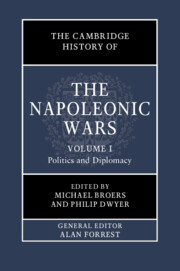Book contents
- The Cambridge History of the Napoleonic Wars
- The Cambridge History of the Napoleonic Wars
- The Cambridge History of the Napoleonic Wars
- Copyright page
- Contents
- Figures and Tables
- Maps
- Contributors to Volume I
- Acknowledgements
- General Introduction
- Introduction to Volume I
- Part I The Origins of the Napoleonic Wars
- Part II Napoleon and his Empire
- Part III War Aims
- 14 French Preponderance and the European System
- 15 Habsburg Grand Strategy in the Napoleonic Wars
- 16 Prussian Foreign Policy and War Aims, 1790–1815
- 17 British War Aims, 1793–1815
- 18 Alexander I’s Objectives in the Franco-Russian Wars, 1801–1815
- 19 Ottoman War Aims
- 20 Spain and Portugal
- 21 War Aims: Scandinavia
- Bibliographical Essays
- Index
18 - Alexander I’s Objectives in the Franco-Russian Wars, 1801–1815
from Part III - War Aims
Published online by Cambridge University Press: 13 October 2022
- The Cambridge History of the Napoleonic Wars
- The Cambridge History of the Napoleonic Wars
- The Cambridge History of the Napoleonic Wars
- Copyright page
- Contents
- Figures and Tables
- Maps
- Contributors to Volume I
- Acknowledgements
- General Introduction
- Introduction to Volume I
- Part I The Origins of the Napoleonic Wars
- Part II Napoleon and his Empire
- Part III War Aims
- 14 French Preponderance and the European System
- 15 Habsburg Grand Strategy in the Napoleonic Wars
- 16 Prussian Foreign Policy and War Aims, 1790–1815
- 17 British War Aims, 1793–1815
- 18 Alexander I’s Objectives in the Franco-Russian Wars, 1801–1815
- 19 Ottoman War Aims
- 20 Spain and Portugal
- 21 War Aims: Scandinavia
- Bibliographical Essays
- Index
Summary
In his youth, Tsar Alexander I had dreamt of being a peaceful and reforming monarch; however, he would see most of his reign unfold under the sign of war. He ‘converted’ to the anti-Napoleon coalition after many doubts and hesitations, only to be confronted in 1812 with a cataclysmic invasion that would cost the Russian Empire 300,000 lives. From the start of the twentieth century until now, many historians have reproached him for having sacrificed the national interest and exhausted the country over useless dreams of grandeur and military glory.1 However, this accusation is baseless. While the military rivalry between France and Russia would in fact prove costly in both lives and resources, it was by no means futile: far from being reduced to the selfish caprice of a sovereign concerned about his image, rivalry with France had a major impact on the destiny and stature of the Russian Empire.
- Type
- Chapter
- Information
- The Cambridge History of the Napoleonic Wars , pp. 372 - 389Publisher: Cambridge University PressPrint publication year: 2022

